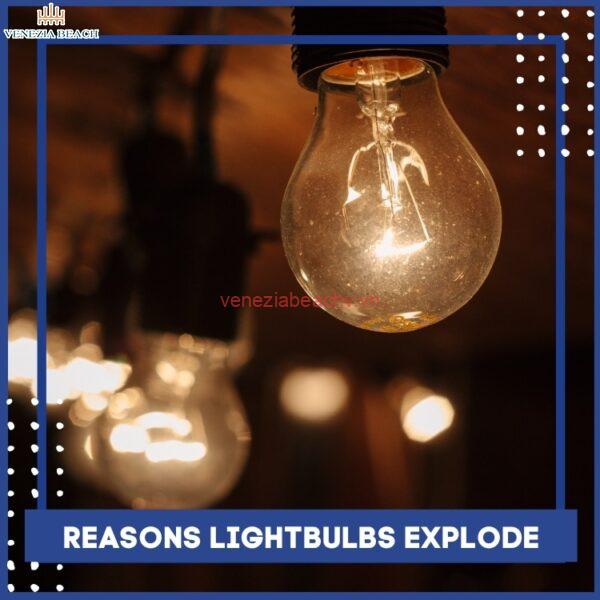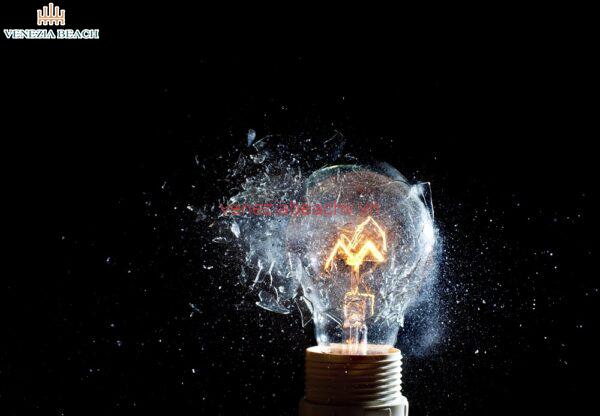The Superstition Behind an Exploding Light Bulb: Unveiling Folklore, Science, Causes, and Safety Measures
Have you ever wondered what it means when a light bulb suddenly explodes? In this article, we will delve into the superstitions surrounding this phenomenon and uncover the truth behind it. From ancient folklore to scientific explanations, we will explore the various beliefs and reasons behind light bulb explosions. Whether you are curious about cultural traditions or looking for safety tips to prevent such occurrences, Veneziabeachv.vn has got you covered.

I. Understanding the Superstition Behind Exploding Light Bulbs
Have you ever witnessed a light bulb suddenly exploding and wondered about its significance? Exploding light bulbs have long held a place in superstitions and folklore, with various cultural beliefs surrounding this phenomenon. While it may seem like a mere coincidence or a result of scientific factors, many individuals attribute deeper meanings to these occurrences.
1. Exploring Superstitious Beliefs
Throughout history, different cultures have developed their own interpretations of exploding light bulbs. In some traditions, it is seen as a sign of an approaching storm or an omen of impending danger. Others believe that it signifies the presence of spirits or supernatural entities. For example, in certain African and Caribbean cultures, a burst light bulb is associated with the presence of ancestors or restless spirits.
These superstitious beliefs are often rooted in fear and the unknown, with individuals seeking meaning and reassurance in the face of unexpected events. Exploding light bulbs can be interpreted as messages from the spiritual realm, prompting people to pay attention to their surroundings and remain vigilant.
2. Cultural Significance and Symbolism
Superstitions surrounding exploding light bulbs can vary greatly depending on cultural backgrounds and beliefs. For instance, in some Asian cultures, a shattered bulb is considered a sign of impending prosperity or a positive change in fortune. On the other hand, in Western societies, it is often associated with bad luck or the disruption of positive energy within a space.
These cultural interpretations and symbolic meanings highlight the influence of traditions and collective beliefs on individual perceptions. Exploding light bulbs serve as a reminder of the cultural diversity and rich tapestry of human beliefs and superstitions.
3. Scientific Explanations and Rational Insights
While superstitions provide fascinating insights into the human psyche, it’s essential to consider scientific explanations when examining the phenomenon of exploding light bulbs. The most common reason for a bulb to burst is a sudden surge of electrical energy, resulting in excessive heat within the bulb. This heat causes the bulb to shatter, often accompanied by a loud popping sound.
Additional factors contributing to light bulb explosions include poor manufacturing quality, faulty wiring or fixtures, and power surges in electrical systems. Understanding these scientific reasons can help alleviate fears and dispel irrational beliefs surrounding exploding light bulbs.
4. Safety Measures and Precautions
While exploding light bulbs may have symbolic or cultural meanings, it’s crucial to prioritize safety and take preventative measures. To minimize the risk of bulb explosions, consider the following precautions:
- Use bulbs with appropriate wattage for fixtures
- Ensure proper installation and secure connections
- Regularly inspect electrical systems and wiring for damage
- Avoid touching a bulb with wet hands
By practicing these safety measures, you can reduce the likelihood of experiencing an exploding light bulb and its potential hazards.

II. Folklore and Cultural Beliefs Surrounding Exploding Light Bulbs
Exploding light bulbs have been the subject of various superstitions and cultural beliefs across different societies throughout history. These folkloric interpretations often attribute mystical meanings to the occurrence, creating a sense of intrigue and curiosity.
1. Superstitions and Symbolism
In some cultures, an exploding light bulb is considered a sign of imminent danger or a bad omen. It is believed to symbolize the disruption of positive energy or the presence of malevolent spirits. For example, in Chinese folklore, a bursting light bulb is associated with the possibility of encountering a ghost or spirit in the vicinity.
2. Spiritual Interpretations
Exploding light bulbs are also linked to spiritual realms and metaphysical phenomena. Some individuals believe that when a light bulb shatters unexpectedly, it signifies a shift in energy or the entry of a spiritual entity into the physical realm. This interpretation aligns with the belief that spirits can influence the physical world and communicate through signs and symbols.
3. Cultural Traditions and Rituals
In certain cultures, such as Mexican and Filipino traditions, the breaking of a light bulb is seen as an opportunity for cleansing negative energies or warding off evil spirits. Rituals involving the disposal of the shattered bulb or the use of protective talismans may be performed to restore harmony and protect against further negative occurrences.
These diverse folklore and cultural beliefs surrounding exploding light bulbs demonstrate the universal human fascination with mysterious phenomena and our inclination to assign meaning to seemingly mundane events.

III. Scientific Explanations for Exploding Light Bulbs
In order to understand why light bulbs may suddenly explode, it is important to explore the scientific explanations behind this phenomenon. While it may be tempting to attribute it to supernatural forces or cosmic energy, there are more rational reasons for these occurrences.
1. Thermal Stress and Temperature Variations
One of the primary scientific explanations for light bulb explosions is thermal stress. When a light bulb is turned on, the filament inside heats up, causing it to expand. As the filament expands, it puts pressure on the glass envelope of the bulb. Over time, continuous heating and cooling cycles can weaken the glass, making it more susceptible to cracking or shattering. Additionally, rapid temperature variations, such as turning a light bulb on and off frequently, can exacerbate thermal stress and increase the risk of explosion.
2. Manufacturing Defects and Poor Quality
Another factor that can contribute to light bulb explosions is manufacturing defects or poor quality materials. In some cases, bulbs may have flaws or weak spots in the glass envelope, making them prone to breaking under normal use. Additionally, using low-quality materials or improper manufacturing techniques can result in bulbs that are more susceptible to thermal stress and failure. It is essential to purchase bulbs from reputable manufacturers and ensure they comply with safety standards to minimize the risk of explosions.
3. Electrical Issues and Power Surges
Electrical issues and power surges can also play a role in light bulb explosions. Power surges, caused by fluctuations in electricity flow, can generate excess heat in a bulb, leading to its failure. Additionally, high voltage or improperly wired fixtures can place additional strain on the bulb, increasing the risk of explosion. It is crucial to address any electrical issues, use surge protectors, and ensure proper wiring to maintain a safe environment and reduce the chances of light bulb explosions.
These scientific explanations provide a logical understanding of why light bulbs may explode, dispelling any supernatural beliefs or superstitions surrounding this occurrence. By being aware of these factors, individuals can take necessary precautions to minimize the risk of accidents and ensure the safety of their lighting systems.

IV. Common Causes of Light Bulb Explosions and Safety Measures
1. Power Surges and Electrical Issues
One common cause of light bulb explosions is power surges. When the voltage in the electrical system spikes, it can cause the bulb to burst. Faulty wiring or fixtures can also lead to electrical issues that result in bulb explosions. To prevent these incidents, it is recommended to use surge protectors and have your electrical system regularly inspected by a professional electrician.
2. Overheating and Thermal Stress
Overheating is another factor that can cause light bulbs to explode. When a light bulb is exposed to excessive heat, such as being placed too close to flammable materials or being used in an enclosed fixture without proper ventilation, it can lead to thermal stress. This stress weakens the bulb’s structure and can cause it to shatter. To avoid this, ensure proper spacing around the bulb and use light fixtures that allow for adequate airflow.
3. Mechanical Damage and Vibration
Mechanical damage and vibration can also contribute to light bulb explosions. Rough handling during installation or accidental bumps can weaken the filament or other components inside the bulb, making it more susceptible to breakage. Additionally, vibrations from nearby machinery or heavy traffic can also cause bulbs to shatter. Handle light bulbs with care during installation and choose vibration-resistant bulbs or fixtures in areas prone to movement.
4. Bulb Defects or Manufacturing Flaws
In some cases, light bulb explosions can be attributed to defects or manufacturing flaws. These flaws may include inconsistencies in the glass, inadequate sealing of the bulb, or substandard filament quality. While rare, these issues can lead to spontaneous bulb failure. Choosing bulbs from reputable manufacturers and ensuring they meet safety standards can help minimize the risk of encountering such defects.
Safety Measures to Prevent Light Bulb Explosions
To reduce the chances of light bulb explosions and promote safety, consider the following measures:
- Use bulbs with the correct wattage for your fixtures to prevent overheating.
- Allow sufficient cooling time before replacing a burnt-out bulb.
- Avoid touching bulbs with bare hands as oil from the skin can cause hot spots.
- Ensure proper installation and secure bulb connections.
- Regularly inspect bulbs for signs of damage or defects and replace them as needed.
- Keep flammable materials away from light fixtures.
- Consider using LED bulbs, which are more durable and less prone to explosions.
By following these safety measures and understanding the common causes of light bulb explosions, you can keep your home and workspace safer and minimize the risk of accidents or damages.

V. Conclusion
In conclusion, the superstition surrounding exploding light bulbs has been deeply ingrained in various cultures and has been passed down through generations. While some may attribute it to folklore and supernatural beliefs, there are scientific explanations for why light bulbs may explode, such as power surges or excessive heat buildup. It is crucial to understand the common causes of light bulb explosions and take necessary safety measures to prevent accidents and protect ourselves. By ensuring proper electrical wiring, using compatible fixtures, and keeping flammable materials away from heat sources, we can greatly reduce the risk of experiencing an exploding light bulb. Remember, superstitions can often be debunked by scientific knowledge, allowing us to approach such phenomena with a logical and informed mindset.